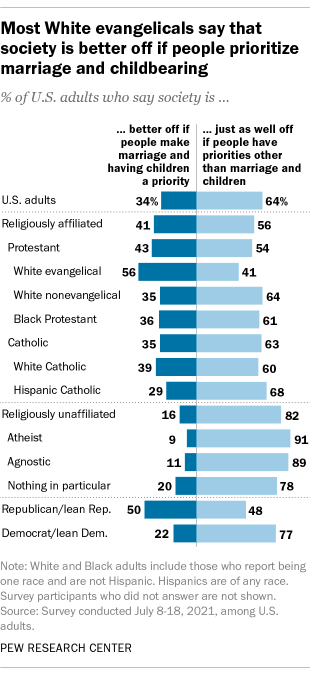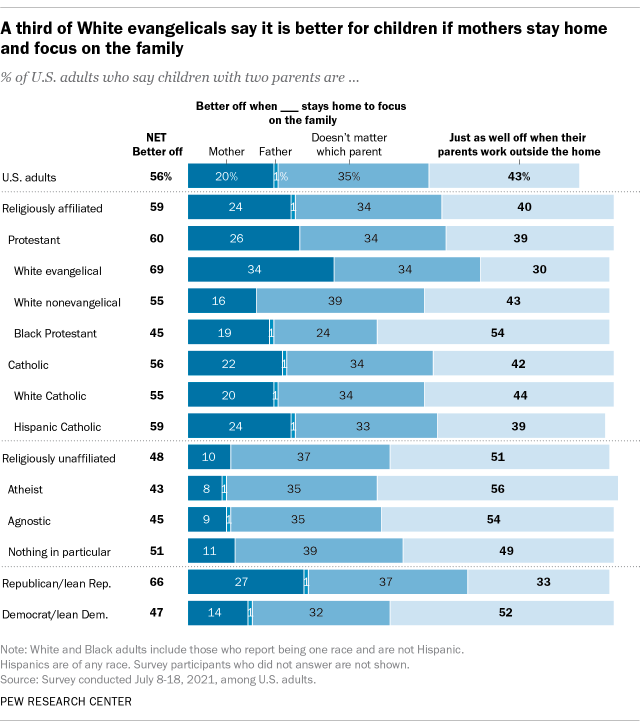
Political differences among U.S. religious groups have been well documented in recent decades. But disagreements among Americans across the religious spectrum extend to issues in the personal realm, too – including priorities in life and gender roles within the family.
White evangelical Protestants consistently hold more traditional views than others, including other Christians, on these questions. And people with no religious identity tend to have the most progressive stances, according to a recent Pew Research Center survey.
Overall, about a third of U.S. adults (34%) say that society is better off if people make it a priority to get married and have children, while almost twice as many (64%) feel that society is just as well off if people have priorities other than marriage and children.
But opinions differ by religion. Among all Americans with a religious affiliation – whether Christian, Jewish, Muslim or something else – 56% believe it is OK for society if people have priorities besides marriage and children, compared with 82% of those with no religion.
White evangelicals are the only religious subgroup analyzed in which a majority (56%) say that prioritizing marriage and having children is better for society; 41% say society is just as well off when people have other priorities. On average, evangelical Christians bear about the same number of children as other Americans, and while they tend to marry at a younger age than other U.S. adults, members of evangelical denominations on the whole are not necessarily more likely to be married than members of other Christian subgroups – and they may have higher divorce rates.
Pew Research Center conducted this analysis to better understand connections between religion and attitudes related to family and gender. The analysis is based on a survey of 10,221 U.S. adults conducted July 8-18, 2021. Here are the questions used in the July survey, along with responses, and its methodology.
All respondents were part of the Center’s American Trends Panel (ATP), an online survey panel that is recruited through national, random sampling of residential addresses. This way nearly all U.S. adults have a chance of selection. The survey is weighted to be representative of the U.S. adult population by gender, race, ethnicity, partisan affiliation, education, religious affiliation and other categories. For more, see the ATP’s methodology.
By comparison, self-described atheists overwhelmingly say society fares just as well when people have priorities other than marriage and children (91%). Most Catholics (63%) and White Protestants who do not identify as evangelical (64%) also take this position. (The survey did not include enough interviews with Jews, Muslims and members of other smaller religious groups to analyze their views separately.)
These patterns extend to measures of religious observance, too. For example, highly religious people – those who say religion is very important in their lives and those who attend religious services regularly – are more likely than Americans who say religion is less important or attend religious services less frequently to say that society is better off if people prioritize marriage and procreation.
These gaps are partly – but not entirely – reflected by people’s political affiliations. Republicans and independents who lean toward the Republican Party are considerably more likely than Democrats and Democratic leaners to see marriage and children as an asset to society (50% vs. 22%). White evangelicals, and highly religious Americans more broadly, are much more likely to be Republicans, but there are still differences by religious group even when controlling for party affiliation and other demographic factors, such as age, gender and educational attainment. For instance, White evangelical Protestant Republicans (60%) are much more inclined than religiously unaffiliated Republicans (29%) to say society benefits if people prioritize marriage and children.
The survey also asked about what is best for children in two-parent families: Are they better off when a parent stays home to focus on the family, or is it just as well if both parents work outside the home?
Most U.S. adults (56%) say that children with two parents are better off when one parent stays home. Again, White evangelicals are the most likely religious subgroup to take this position (69%). Roughly one-in-five American parents with children in their household stay home, a figure that has been consistent for at least three decades.
Adults who said that children are better off if a parent forgoes outside work to focus on the family were asked which parent ideally should stay home. About a third of U.S. adults (35%) believe that a parent should stay home but that it doesn’t matter which parent, while one-in-five (20%) believe children are better off if mothers in particular stay home – just 1% say this about fathers.
White evangelicals who think children are better off with a parent at home are evenly split on this question: About a third (34%) think that mothers should stay home, and just as many (34%) say that it does not matter which parent focuses on the family. Roughly half as many White Protestants who are not evangelical (16%) and only one-in-ten religious “nones” say that it is best for children if mothers stay home.
Note: Here are the questions used for this report, along with responses, and its methodology.


